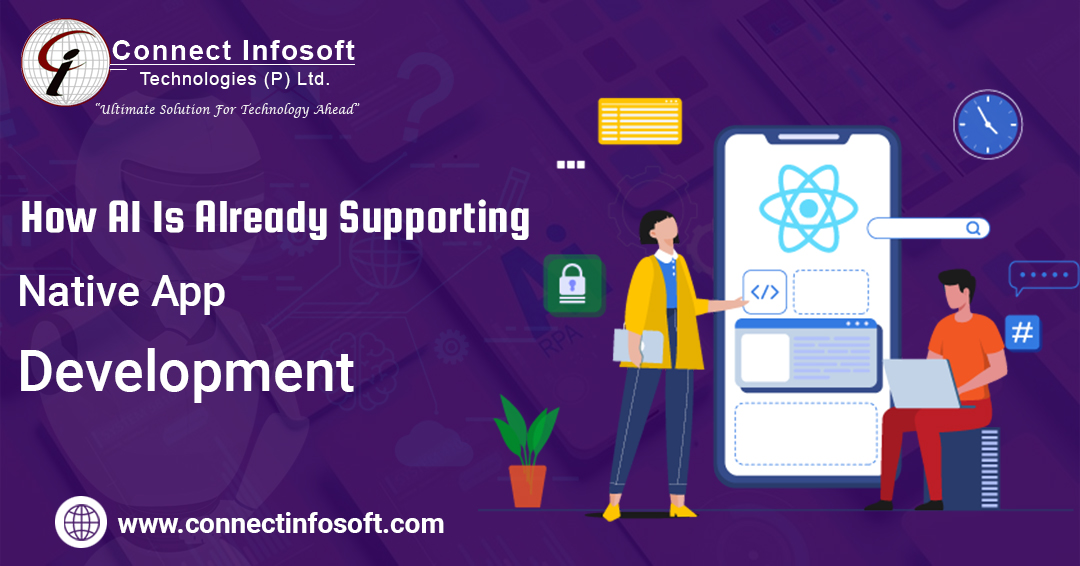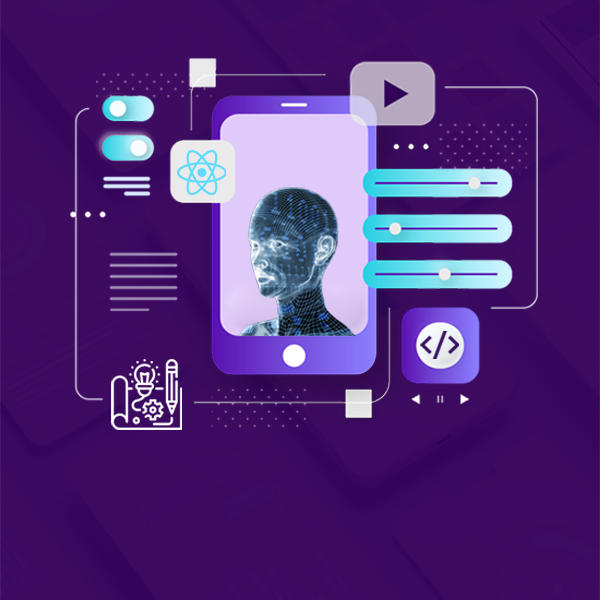How AI Is Already Supporting Native App Development | Connect Infosoft

Artificial Intelligence (AI) has emerged as a transformative technology across various industries, and native app development is no exception. AI is revolutionizing the way mobile applications are developed, making the process more efficient, intelligent, and user-centric.
We will explore how AI is already supporting native app development and revolutionizing the way developers create innovative and engaging mobile experiences.
1. Enhanced User Experience through Natural Language Processing (NLP):
One of the significant ways AI supports native app development is through Natural Language Processing (NLP). NLP enables apps to understand and process human language, facilitating seamless interaction between the user and the application. AI-powered chatbots and virtual assistants leverage NLP to provide personalized and conversational experiences, enhancing user engagement and satisfaction.
Chatbots can handle customer queries, provide recommendations, and even perform tasks like booking appointments or making purchases within the app. By leveraging AI and NLP, native app developers can create intuitive and interactive user experiences, making the apps more user-friendly and efficient.
2. Intelligent Personalization with Machine Learning (ML):
Machine Learning (ML) algorithms enable native apps to learn from user interactions and preferences, allowing for intelligent personalization. ML algorithms can analyze user data, such as browsing habits, purchase history, and app usage patterns, to provide tailored recommendations, content, and experiences.
For example, a music streaming app can use ML algorithms to curate personalized playlists based on the user's listening history and preferences. E-commerce apps can leverage ML to provide product recommendations based on the user's browsing and purchasing behavior. By integrating AI and ML capabilities, native app developers can create highly personalized experiences that cater to individual user needs and preferences.
3. Efficient Testing and Debugging with AI-powered Tools:
AI-powered testing and debugging tools streamline the app development process, making it more efficient and error-free. These tools use AI algorithms to automatically identify and fix common coding errors, enhance code quality, and optimize app performance.
AI-powered testing tools can simulate user interactions, identify potential bugs, and suggest improvements, reducing the time and effort required for manual testing. This not only speeds up the development process but also improves the overall quality and reliability of native apps.
4. Automated Code Generation and Rapid Prototyping:
AI is also being leveraged to automate certain aspects of code generation and prototyping, accelerating the app development process. AI-powered tools can analyze design patterns, user requirements, and existing codebases to generate code snippets, reducing the manual effort required for repetitive coding tasks.
Additionally, AI-based prototyping tools can transform wireframes and design mockups into functional prototypes, allowing developers to quickly iterate and refine app designs. These automated processes enable faster development cycles and empower developers to focus on more complex and creative aspects of app development.
5. Data-driven Insights for App Optimization:
AI algorithms can analyze vast amounts of user data to provide valuable insights for app optimization. Native app developers can leverage AI-powered analytics tools to track user behavior, engagement metrics, and conversion rates, allowing them to make data-driven decisions for improving app performance and user experience.
By analyzing user data, developers can identify pain points, optimize user flows, and make informed decisions about feature prioritization and updates. AI-driven analytics not only provide valuable insights but also facilitate continuous improvement and optimization of native apps.
Conclusion:
AI is already playing a significant role in supporting native app development by enhancing user experiences, enabling intelligent personalization, automating testing and debugging, expediting code generation, and providing data-driven insights. By harnessing the power of AI, native app developers can create innovative, intelligent, and user-centric mobile experiences.
As AI continues to evolve and advance, we can expect even more exciting possibilities for native app development. From voice-based interactions to predictive analytics and beyond, AI will continue to revolutionize the way we design, develop, and interact with mobile applications, opening up new avenues for creativity and innovation in the native app development landscape.


